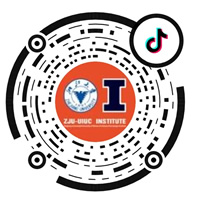On July 7th, the opening ceremony of the Smart City module of the 2025 SDG Global Summer School at Zhejiang University was held in the Multimedia Hall of the International Campus, Zhejiang University. This module offered by the Zhejiang University-University of Illinois at Urbana-Champaign Institute (ZJUI), which brings together over 20 students from renowned universities worldwide, including University College London, Cornell University, the National University of Singapore, Zhejiang University, and Northwestern Polytechnical University.During the ceremony, Professor Qu Haidong, Vice Dean of the International Campus, Zhejiang University, Professor Lee Der-Horng, Dean of ZJUI, Professor Ma Hao, Vice Dean of ZJUI, Associate Professor Yang Liangjing, module faculty representative, and Jin Zhe, student representative delivered speeches respectively. The ceremony was hosted by Professor Wang Hongwei, Vice Dean of ZJUI.
▲ Prof. Qu Haidong, Vice Dean of the International Campus, Zhejiang University, delivered welcome remarks
At the opening ceremony, Prof. Qu Haidong, on behalf of the International Campus, welcomed young students from around the world to gather at ZJUI and embark on a two-week learning journey. He pointed out that in this critical period when the world faces environmental challenges and development transformation, the realization of the UN 2030 Sustainable Development Goals (SDGs) requires the extensive participation and diverse cooperation of young people. As an important part of "Zhejiang University's Action Plan for Sustainable Development (Z4G)"—a initiative launched by Zhejiang University in response to the UN 2030 SDGs—the SDG Global Summer School not only builds a cross-cultural and interdisciplinary learning platform, but also inspires young students' sense of responsibility and practical capabilities in addressing sustainable development issues. He emphasized that the International Campus will continue to leverage its unique advantages in global scholar development and technological innovation, encouraging students to break down disciplinary barriers with an open perspective, exert the power of youth on the path of pursuing sustainable development, and become active participants and firm practitioners who connect different cultures, promote social change, and work together to build a better future.

▲ Prof. Lee Der-Horng, Dean of ZJUI, delivered welcome remarks and introduced ZJUI
Prof. Lee Der-Horng offered a warm welcome and sincere thanks to the faculty and students joining this Smart City Module, and shared ZJUI’s development history and distinctive approach to education. He noted that ZJUI is committed to building an educational ecosystem rooted in interdisciplinary integration, openness and inclusiveness that encourages students to explore the frontiers of knowledge across disciplines and foster in-depth connections between engineering, technology and society. This Smart City Module has invited experts and scholars from domestic and international universities such as the University of Cambridge, National University of Singapore (NUS), University of Washington, and Zhejiang University. Focusing on the core topics of smart cities, it has built a learning platform that combines international perspective with practical concern. He encouraged the students to make the most of ZJUI's interdisciplinary platform, keep innovating through exchanges and learning with an open, inclusive mindset, jointly explore the future directions of smart cities, and embark on a learning journey filled with challenges and growth.

▲ Prof. Ma Hao, Vice Dean of ZJUI, introduced the module
Prof. Ma Hao gave a brief overview of the 14-day curriculum for the Smart City Module. The course will focus on two core areas—Internet of Things (IoT) and Robotics and Smart Transportation and Autonomous Driving—delivering two weeks of immersive learning. Through classroom lectures, group discussions, on-site teaching, and cultural exchanges, the course will help students gain a multi-dimensional understanding of the development and implementation pathways of smart cities in a global context, as well as deepen their awareness of the concepts and practices behind the UN Sustainable Development Goals (SDGs). He expressed hope that students would take this course as an opportunity to actively participate, engage in in-depth thinking, expand the boundaries of interdisciplinary knowledge, enhance cross-cultural understanding and sustainable thinking, and lay a solid foundation for their future in-depth learning and diverse development in the field of smart cities and related areas.

▲ Prof. Wang Hongwei, Vice Dean of ZJUI, hosted the ceremony

▲ Associate Prof. Yang Liangjing spoke as module faculty representative

▲ Jin Zhe spoke as student representative
Yang Liangjing, module faculty representative, stated that the diverse curriculum would bring a unique learning experience to the students and looked forward to all students gaining valuable insights from the program.
Jin Zhe, the student representative, expressed eager anticipation for the Smart City Module, hoping to broaden his horizons and achieve personal growth through cross-cultural exchanges.

Smart City is a new urban model that optimizes urban management and services through intelligent means. As one of the key strategies to achieve sustainable development, it will promote more efficient, greener, and more sustainable social development, and create a more convenient and comfortable living environment for people.
Focusing on two knowledge areas—Smart Transportation and Autonomous Driving and Internet of Things (IoT) and Service Robots—this module guides students to systematically learn the core concepts of Smart City and explore its development pathways. The goal is to further enhance their ability to use digital tools to address urban issues and contribute ideas to solving global sustainable development challenges.







